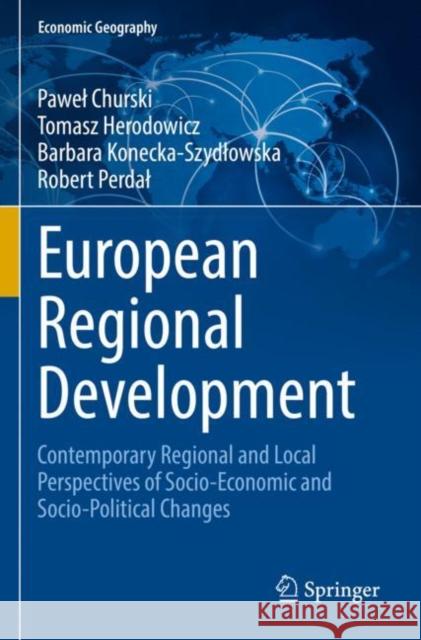European Regional Development: Contemporary Regional and Local Perspectives of Socio-Economic and Socio-Political Changes » książka
European Regional Development: Contemporary Regional and Local Perspectives of Socio-Economic and Socio-Political Changes
ISBN-13: 9783030846619 / Angielski / Miękka / 2022 / 382 str.
European Regional Development: Contemporary Regional and Local Perspectives of Socio-Economic and Socio-Political Changes
ISBN-13: 9783030846619 / Angielski / Miękka / 2022 / 382 str.
(netto: 498,38 VAT: 5%)
Najniższa cena z 30 dni: 501,19
ok. 16-18 dni roboczych.
Darmowa dostawa!
This book offers a comprehensive overview of contemporary issues of regional development. It places particular emphasis on its socio-economic and socio-political determinants which accompany the problem of existing and ever-widening differences in the level of regional development in various parts of Europe. In order to diagnose the scale of those differences and to indicate the main forces behind the divergence of development, the authors propose an original systematisation of regional development factors, drawing attention to the need to consider them within the framework of present-day socio-economic megatrends. The proposed approach to the development factors is also used for the author's operationalisation of the concept of territorial capital, which is at the centre of regional place-based policy.The wide spatial aspect of the analysis (national and local) and its extensive temporal scope (2004-2019) yields unique results and creates an important element of added value for this book, which shows the regularities of the process of regional development in Europe at three spatial levels - pan-European, national and intra-regional. Furthermore, it indicates the challenges faced by regionalists who attempt to carry out research on different territorial levels with a diverse number of units (205 EU regions, 16 Polish voivodeships, 2,478 Polish local units) and extended observation periods (2004-2017). The solutions proposed by the authors, who show the potential of overcoming the barriers resulting from limited access to complete and comparable statistical data series, should be inspiring for many researchers. The unique results of direct research carried out on a large sample of respondents and entrepreneurs via diverse field research techniques constitute a valuable source of information on local conditions that impact contemporary development processes in less developed regions. Their value is even greater because they were carried out in a unique laboratory created by the authors for testing the regularity of formation and impact of socio-economic development factors in various locally determined conditions of this process. It consists of purposefully selected test units (LAU2). Located in a less developed region, they represent all growth types and functional test units identified in the course of the research. Consequently, the results obtained may be generalised and applied to other areas showing similar features of territorial capital.The monograph is addressed primarily to a wide group of regionalists connected with economic and social sciences as well as to practitioners involved in the implementation of development policies at various levels.
This book offers a comprehensive overview of contemporary issues of regional development. It places particular emphasis on its socio-economic and socio-political determinants which accompany the problem of existing and ever-widening differences in the level of regional development in various parts of Europe. In order to diagnose the scale of those differences and to indicate the main forces behind the divergence of development, the authors propose an original systematisation of regional development factors, drawing attention to the need to consider them within the framework of present-day socio-economic megatrends. The proposed approach to the development factors is also used for the author's operationalisation of the concept of territorial capital, which is at the centre of regional place-based policy.The wide spatial aspect of the analysis (national and local) and its extensive temporal scope (2004-2019) yields unique results and creates an important element of added value for this book, which shows the regularities of the process of regional development in Europe at three spatial levels - pan-European, national and intra-regional. Furthermore, it indicates the challenges faced by regionalists who attempt to carry out research on different territorial levels with a diverse number of units (205 EU regions, 16 Polish voivodeships, 2,478 Polish local units) and extended observation periods (2004-2017). The solutions proposed by the authors, who show the potential of overcoming the barriers resulting from limited access to complete and comparable statistical data series, should be inspiring for many researchers. The unique results of direct research carried out on a large sample of respondents and entrepreneurs via diverse field research techniques constitute a valuable source of information on local conditions that impact contemporary development processes in less developed regions. Their value is even greater because they were carried out in a unique laboratory created by the authors for testing the regularity of formation and impact of socio-economic development factors in various locally determined conditions of this process. It consists of purposefully selected test units (LAU2). Located in a less developed region, they represent all growth types and functional test units identified in the course of the research. Consequently, the results obtained may be generalised and applied to other areas showing similar features of territorial capital.The monograph is addressed primarily to a wide group of regionalists connected with economic and social sciences as well as to practitioners involved in the implementation of development policies at various levels.











